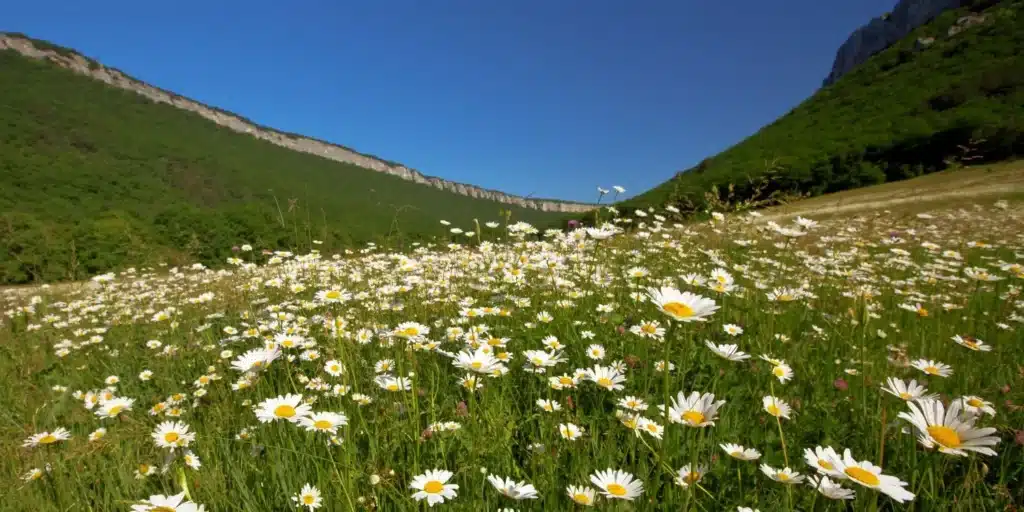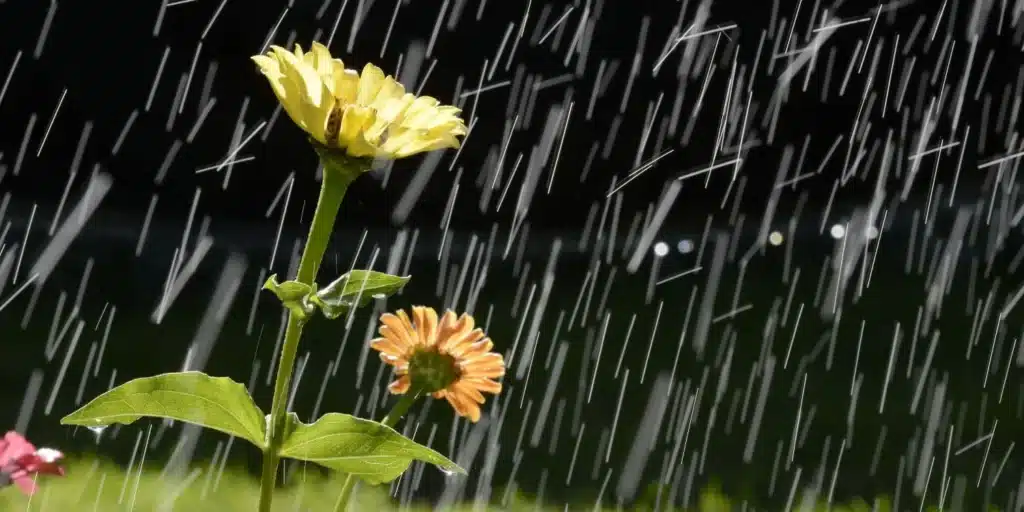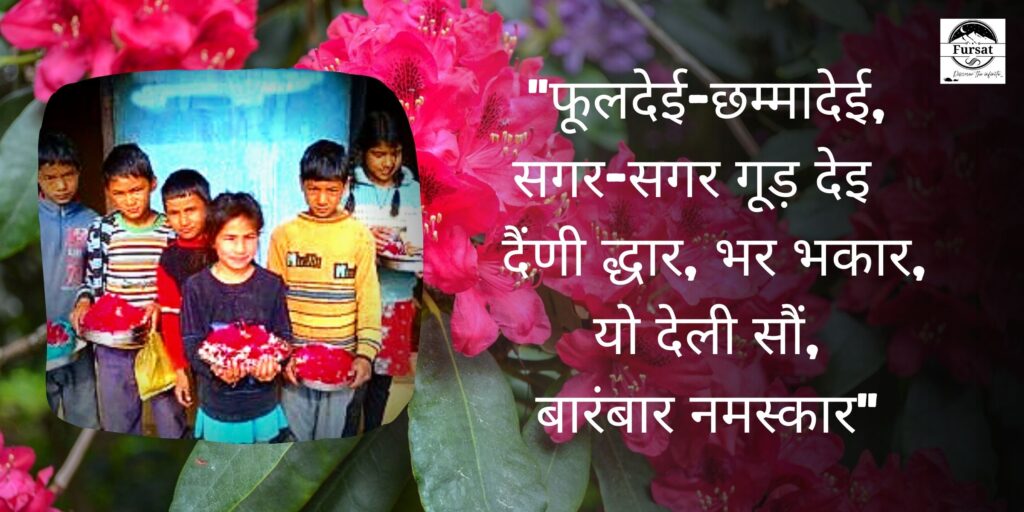Every spring, the streets of Uttarakhand come alive with the Phool Dei festival. It’s a time to celebrate nature and the arrival of a new season. As kids, we would get up early to collect flowers and deliver them to our neighbors. It was such a fun tradition!
But now, as we look back, we see that the festival is about much more. It’s a way to show appreciation for nature and the divine. Fresh flowers symbolize hope, new beginnings, and growth. It’s a way for our ancestors to teach us the importance of nature and keep our cultural heritage alive.
Phulari, also known as Phool Dei, is a traditional festival celebrated in the northern Indian state of Uttarakhand. This festival is celebrated on the first day of the Hindu month, Chaitra (February-March). It symbolizes the arrival of spring and the beginning of the agricultural season.
Passing on the Tradition: The Phoolyari Children of Uttarakhand
If you visit Uttarakhand during spring, you’ll see a lot of kids walking around with flowers. These kids are called Phoolyari and are a big part of the Phool Dei festival. The idea is to place flowers at the doorsteps of homes to say hello to spring and ask for good luck from the gods.
Everyone in the neighborhood gets involved in the Phool Dei festival. Every day, the Phoolyari visit each house with flowers, and on the last day of spring, families give them money and sweets as a thank you. It’s a fun and memorable time for everyone!
People here believe that putting flowers on their doorsteps will bring good fortune and blessings. It’s a way to show gratitude for the arrival of spring and all the new beginnings it brings. And by participating in the festival, families can keep their cultural traditions alive and pass them down to future generations.
Also Read: Duryodhana Temple in Uttarakhand
Why Phooldei is Celebrated?
There is a girl named Pyonli from Uttarakhand. She loved all the trees, flowers, and animals around her very much. Everyone and everything in the mountains had a special connection with Pyonli.
Once, a prince came to the forest for hunting. While exploring, he got lost and had to seek shelter in a nearby village. There, he saw Pyonli and was enchanted by her beauty.
The prince fell in love with Pyonli and decided to marry her. He took her to his palace, far away from the natural beauty she cherished. Pyonli missed her home terribly, and the palace life made her unhappy. She longed for her friends and the serene life in the mountains.
Despite Pyonli’s pleas to return home, the prince didn’t listen. Pyonli became ill due to her longing for her homeland and eventually passed away. As per her wishes, she was laid to rest near her village.
After Pyonli’s departure, a beautiful yellow flower bloomed on her grave. People lovingly named it the “Pyoli flower” in memory of Pyonli. Since then, it’s believed that the Pyoli flower blooms in the mountains of Uttarakhand to remind people of Pyonli’s love for nature.

The Pyoli flower is also known as “Buransh” in the local language and holds a special place in Uttarakhand’s culture. Interestingly, it is the state tree of Uttarakhand, symbolizing the region’s natural beauty and heritage. And every year, people celebrate the Phooldei festival in memory of Pyonli and her love for the mountains.
Also Read: 7 Amazing Temples In Kumaon
फूलदेई त्योहार क्यों मनाया जाता है? (Hindi Version)
उत्तराखंड की लोककथाओं के अनुसार, प्योंली एक सुंदर कन्या थी जो अपने आस-पास के सभी पेड़-पौधों, फूलों आदि से बेहद प्रेम करती थी। उसका प्रेम न केवल फूलों और पेड़-पौधों से था, बल्कि इस प्रकार के सभी प्राकृतिक प्राणियों से भी।
एक बार, जंगल में हिरण शिकार के लिए एक राजकुमार गया। जब रात होने लगी, तो उसे रास्ता भटक गया। उसने एक गाँव में आश्रय लेने का निर्णय किया, जहाँ उसने प्योंली को देखा और उसकी सुंदरता में मोहित हो गया।
राजकुमार प्योंली से प्रेम कर बैठा और उसके साथ विवाह कर, उसे अपने देश ले गया। प्योंली अब राजमहल में आई थी, लेकिन वह अपने सभी दोस्तों से अलग थी। उसे अब अपने गाँव की याद आने लगी, उसके मित्रों से दूर होने का दुख उसे अहसास होने लगा।
जंगल में, प्योंली के बिना पेड़-पौधे मुरझाने लगे, फूल मुरझाने लगे, जंगली जानवर उदास रहने लगे। प्योंली राजमहल में आई, लेकिन राजमहल में उसे संजीवनी नहीं मिली। राजमहल का भव्यता उसे अच्छी नहीं लगी, उसका मन वहां नहीं लगता था, और वह बीमार पड़ गई।
प्योंली राजमहल में रहते समय हमेशा अपनी सास और पति से वियोग की याचना करती रही, लेकिन उन्होंने उसकी बात नहीं मानी। मायके की याद में प्योंली का मन बेचैन रहता गया, और एक दिन वह मर गई।
प्रियंकुमारी की इच्छा के अनुसार, उसको उसके गाँव के पास ही दफनाया गया। कुछ दिनों बाद, जहाँ प्योंली को दफनाया गया था, वहां एक सुंदर पीले रंग का एक फूल खिल गया। लोगों ने इसे “प्योंली का फूल” कहकर पुकारा। यह माना जाता है कि यह फूल प्योंली के प्यार को स्मरण करता है और उसकी याद में खिलता है।
उत्तराखंड के पहाड़ों में प्योंली की याद में “फूलदेई” का त्योहार मनाया जाता है, जिससे उसकी यादें सदैव ताजगी बनी रहती हैं।

A Tribute to Nature’s Beauty
The people of Uttarakhand greet nature during the Fulari festival by placing fresh flowers at the doorsteps of their homes. This act symbolizes their appreciation for nature’s beauty and abundance and is a way of asking for the gods’ blessings and prosperity. The festival is a celebration of spring, a time when the world comes alive with new growth and beauty. The Phoolyari children, who collect and deliver the flowers, play a vital role in preserving this tradition. By celebrating Fulari, the people of Uttarakhand show their love and gratitude for nature and ensure that this tradition continues from generation to generation. The people of Uttarakhand sing a song to welcome spring during the festival.
Phooldei, chhammadei, sagar sagar gudh dei.
Daini dwar, bhar bhakar, Ye deli par barambar namaskar.
“फूलदेई-छम्मादेई, सगर-सगर गूड़ देइ
दैंणी द्धार, भर भकार, यो देली सौं, बारंबार नमस्कार”
The above lines mean
“Let the homes where the flowers are placed be prosperous, wealthy, and peaceful. May their grain storage always be full. And let us respectfully greet these homes again and again.”
Also Read: Places to Visit in Almora
Highlights:
• Every spring, the Phool Dei festival is celebrated in Uttarakhand to welcome the arrival of spring and the new season.
• Kids called Phoolyari collect and deliver flowers to homes in the neighborhood as part of the festival.
• Placing flowers at the doorsteps of homes symbolizes appreciation for nature and asks for good luck from the gods.
• On the last day of spring, families give the Phoolyari money and sweets as a thank-you for their participation.
• The festival is a way for people to show gratitude for the arrival of spring and its new beginnings.
• Tradition is also a way to keep cultural heritage alive and pass it down to future generations.
• The festival is a celebration of nature and its beauty, and the Phoolyari children play a vital role in preserving it.
• People sing a song to welcome spring during the festival and express their love and gratitude for nature.
• The song reflects the belief that placing flowers at the doorsteps of homes will bring prosperity, wealth, and peace.
• The Fulari festival is a time to celebrate new growth, beauty, and the abundance of nature in Uttarakhand.

Summary
The Phool Dei festival is a cherished tradition in Uttarakhand that brings people together to celebrate nature and the arrival of spring. The Phoolyari children play a significant role in preserving this cultural heritage by delivering flowers to homes and spreading joy throughout the community. This festival is a symbol of gratitude and appreciation for nature, as well as a way to ask for blessings and good luck from the gods. The song sung during the festival is a heartfelt tribute to the beauty and abundance of nature and is passed down from generation to generation. The Phool Dei festival is a reminder of the importance of preserving our cultural heritage and the special connection we have with nature.
Want to feature your post on Fursat? Send your content to [email protected] now!
Thank you
Thank you for taking the time to read this post. I hope you found the information useful and inspired you to explore this beautiful festival. If you have any questions or comments, please leave them below. Your feedback is important and will help me improve my future posts.

Lovely information with sweet simplicity
Thank you so much Ashish
Fantastic site